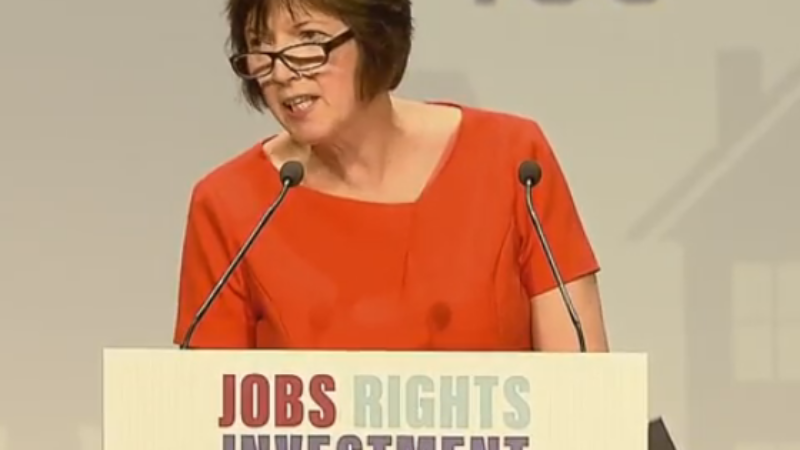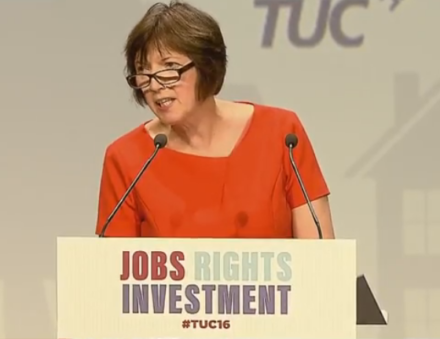

The TUC is in real danger of creating an unbridgeable gap between itself and working people if it continues to pursue its current Brexit policy. The report of the General Council to Congress 2017 sets ‘jobs, rights and livelihood’ as the sole tests for any Brexit deal concluding that these can be achieved through membership of the single market and the customs union.
Elevating jobs, rights and livelihood above all else demeans trade unionists and portrays workers as automatons with no sole or aspirations other than scraping a living. If the TUC tests were to be the guiding principles to action, workers would never have engaged in any form of industrial action because, where withdrawal of labour is involved, the loss in pay is never recovered even if striking workers win their demands.
Had the TUC been in existence in 1862 and made ‘jobs, rights and livelihood’ the absolute priority it now claims them to be, it would’ve sided with the Lancashire mill owners who wanted to break the embargo on cotton coming from Confederate slave plantations rather than abiding the boycott imposed by Abraham Lincoln , a boycott that was supported and enforced by mill workers at a great cost to their jobs and their livelihoods: 60% of spindles and looms were laid idle as a result of the boycott leaving workers out of work, many facing starvation.
Had these workers applied the ‘TUC tests’, they would’ve welcomed the cotton that was gathered by slaves because that would’ve preserved their jobs. So it is with Brexit; there is more to the working class than pay and conditions. They may be wage slaves, but they have no truck with the slave mentality the TUC promotes. The 17.4 million who voted to leave the EU in 2016 were only following in the footsteps of the Lancashire mill workers in 1862; in one case to free American slaves and in the other to free themselves.
Even if its tests were to be accepted as definitive, membership of the single market falls short of satisfying them. In the Brexit statement to the Congress 2017, the TUC calls on the government to set out a more active industrial and fiscal strategy including reversing ‘the worse examples of privatisation and outsourcing of public services’ and bringing austerity to an end, all of which are the very policies that the EU have and continue to champion and enforce on member states.
This the TUC is well aware of for, further on in the same document it demands the ‘EU reverse the austerity policies of the European Central Bank … that did so much damage to countries like Greece, Ireland, Spain and Eastern Europe’. Aware that state aid and public ownership, so vital to the TUC’s own industrial and social strategy, are not permitted under the rules of single market, the TUC calls on the EU to accept that ‘state aid, control and ownership [are] appropriate ways of achieving social objectives, as well as promoting quality public services and the use of progressive public procurement policies’.
It goes further and condemns the ‘EU’s promotion of liberalisation and competition … which has done huge damage to the services working people rely on, widened inequality by enriching private corporations and brought greater insecurity and lower pay to working people’. The EU is anti-worker and pro big business, not exactly the sort of thing to which any self-respecting trade unionist would wish to belong.
As for protecting of workers’ rights, the TUC seems to put greater faith in unelected and unaccountable EU bureaucrats than an elected government answerable to the public that can be thrown out through well-established democratic processes. Contrast the way our parliament with 73% for remain voted overwhelmingly to invoke Article 50 with the way the EU systematically fails to respect votes that go against its policies, forcing the recalcitrants to vote and vote again till they vote the right way.
On the issue of workers’ rights, the EU has form: It has consistently condoned attacks on these rights as in the case of Italy and France and instigated them as in the case of Greece. History proves that the only guarantee to maintaining and improving workers’ rights is the strength of our organisation and not a mythical Guardian Angel.
The TUC acknowledges the ‘genuine concerns of working people about the impact of migration on stretched public services, transport and housing’ but goes on to blame ‘politicians who have imposed savage cuts’; if only it is as simple as that. Even with the best will in the world, it would not be possible to build the extra houses and provide enough school places, adequate number of hospital beds and additional GP surgeries let alone make the necessary improvements to transport and social amenities, all of which take years to come to fruition, if the number of immigrants coming into the country, their composition in terms of age, capacity and skill is unknown, one year to the next.
In 2004, when the free movement of labour from Eastern Europe came into effect, the then Labour government’s forecast for the number of immigrants from Eastern Europe was 13,000; the actual figure was in excess of 300,000.
The TUC must stop patronising workers, telling them what is and what isn’t good for them and start listening. In the EU referendum the TUC campaigned for remain because they argued workers are better off in the EU. Workers said no and voted to leave the EU and the single market and bring the freedom of movement to an end; but the TUC continues promoting the same policies as if the vote never took place. The TUC should grab the opportunities offered by our departure from the EU instead of looking back to a discredited and rejected past. Failure to do that will soon render the TUC irrelevant.
Fawzi Ibrahim is national officer at Trade Unionists Against the EU.




More from LabourList
MPs, union leaders and organisations react to ‘bruising’ Gorton and Denton result
A gory night for Labour
‘SEND reforms are a crucial test of the opportunity mission’